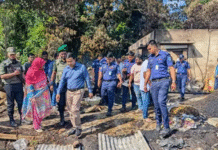Experts at a seminar on marine resources management on Thursday stressed exploring enormous marine resources professionally and methodically to help Bangladesh reach the newer stage of development.
They also advocated for a detailed ‘careful study’ to identify the resources that Bangladesh have so that the resources can be explored in perfectly for economic benefit.
Bangladesh Institute of International and Strategic Studies arranged the seminar on ‘Marine Resources Management of Bangladesh in the Context of Newly Demarcated Boundary’ at its auditorium in the city.
State minister for foreign affairs M Shahriar Alam spoke at the seminar as the chief guest with chairman, BIISS board of governors Munshi Faiz Ahmad in the chair.
Secretary of maritime affairs unit at the foreign ministry Rear Admiral M Khurshid Alam, Jahangirnagar University professor Abul Kalam Azad, Metropolitan Chamber of Commerce and Industry president Syed Nasim Manzur and director of hydrography at naval headquarters Captain Mir Imadul Haque made separate presentations on the issue.
BIISS director general Major General AKM Abdur Rahman, Myanmar ambassador in Dhaka Myo Myint Than, former diplomats and academicians also spoke on the occasion.
Addressing the seminar, Shahriar said the state assumes primary responsibility in sustainable management of marine resources indeed, but the private sector would continue to play a key role in blue growth across range of sectors.
The government would facilitate a greater role and engagement of private sector; and consider policies, strategies and modalities so that their collaboration and engagements across all areas of marine resources remain responsible, he said.
‘We believe safe and secure ocean is a pre-requisite to economic development, and sustainable marine resource management is one of the key elements for that development,’ said Shahriar.
He observed that the lack of skilled human resource, institutions and technology are key challenges for Bangladesh to effectively utilise the marine resources.
‘Presently, we are in dearth of modern technology, finance and logistic to further expand and enhance our common sectors like fisheries, tourism, maritime transport and ship building and ship recycling,’ he said.
Shahriar said the Bay of Bengal could determine Bangladesh’s future development and economic growth through expansion of international trade, use of marine mineral resources for long term energy security, proper management of marine fish resources and protection of bio diversity and marine environment.
The marine based economic activities alongside the existing land based development activities could further expedite the development of the coastal countries like Bangladesh and the developing coastal states, he added.
Highlighting the importance of the private sector, Nasim Manzur said Bangladesh needs foreign direct investment from countries Like South Korea and Canada to help explore the marine resources properly.
He also said the government must continue investment in the sector.
Imadul Haque said they need to look at all the sectors in a combined way instead of looking at individual issue. ‘Bangladesh needs serious preparations to explore the potentials.’
He also laid emphasis on reducing gap in the administration to work together all the bodies concerned.
The concept of the blue economy is receiving a substantial attention from major global actors like Japan, China and the European Union.
The discussants said Bangladesh should also engage more efforts in that direction and expand the economy, the newly demarcated maritime boundary remains a vital resource base to tap into.
They highlighted the initiatives taken so far the potential ones by Bangladesh to that end and the challenges and how to deal with those.
Source: New Age









